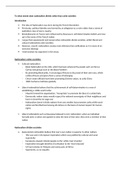Essay
Complete A* Essay Plan - To what extent does nationalism divide rather than unite societies
- Institution
- PEARSON (PEARSON)
A sustained, balanced, and supported essay plan that is sure to award you full marks. I wrote this essay for an assignment and was awarded 24/24.
[Show more]



